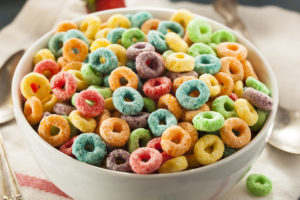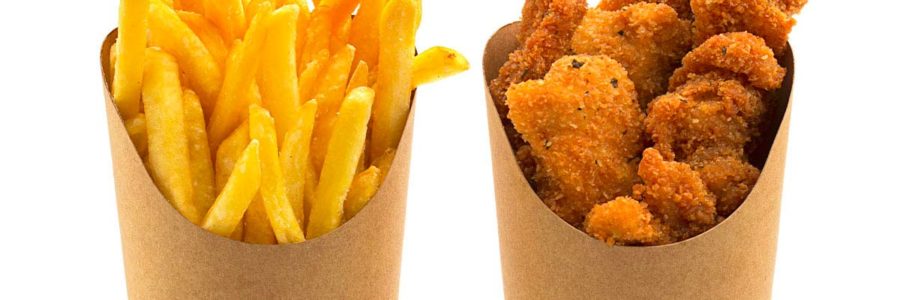Top Inflammatory Foods: Here we take a closer look at inflammation. Is it all bad? What foods contribute to it, and what can we eat instead to lower our inflammation levels

This article has been medically reviewed by Dr. Charles Penick, MD
What is Inflammation?
Inflammation is a response in the body that essentially causes swelling. Inflammation is not always a bad thing. Acute (short-term) inflammation actually serves the essential purpose of stimulating healing in times of injury or illness.1
However, chronic low-level inflammation is one of the symptoms of poor lifestyle choices that can lead to an array of illnesses, including diabetes, obesity, heart disease, arthritis, cancer, bowel disease, and more.1-4
Many things can lead to low-level chronic inflammation, all rooted in stress. Stress can come in physical, emotional, or chemical forms. Stressors may include diet, movement (too much or too little), environmental exposure to inflammatory triggers (like pollution), and even beliefs.1,5
How to Follow an Anti-Inflammatory Diet
The foods you eat are among the most significant causes of chronic inflammation, which is good because it is within your control to change. With lots of science to support nutritional wisdom, addressing your diet is one thing you can do to empower yourself, support your physical and mental health, and provide your body with snowballing positive benefits.6
Following an anti-inflammatory diet can be very simple. The basic concept is eating whole foods (also known as unprocessed foods) full of vegetables, pasture-raised proteins, and good fats. In doing so, the aim is to provide your body with abundant nutrients while maintaining healthy blood sugar levels.6
As you will learn below, many ingredients in packaged foods contain highly processed, inflammatory-causing foods. Including artificial sugars, processed carbohydrates, processed meats, refined salts, and fried foods: the more foods that have been heavily manufactured and processed, the worse they will generally be for your health.
Allergies and Intolerances
One quick note on foods in general and categorizing things as “good” or “bad.” No single food is suitable for every person; food that might be anti-inflammatory for one person could cause inflammation in another.
One of the significant differentiators of good foods for one vs. bad foods for another is allergies and intolerances. Allergies are more obvious and tend to cause a more pronounced adverse reaction– but intolerances are less so.
The best way to get to know your bio-individual nutrition blueprint would be to follow an elimination diet. Elimination diets strip back your foods to the most basic foods and slowly introduce new foods one by one to see how your body reacts to them.
Nightshades (like tomatoes, peppers, and eggplants) are common trigger foods for people.7 Although we do not include them or other common allergens (like peanuts, eggs, or soy, start with the list below, and then tailor your diet to your individual needs.
Top Inflammatory Foods and Their Healthy Replacements
Inflammatory foods fall into some basic categories. Understanding options for anti-inflammatory replacements can help you navigate towards a healthier, more vibrant version of yourself.
1. Vegetable and Seed Oils

Over the past few generations, the ratio of omega 3 to omega 6 fatty acid consumption shifted from 1:1 to approximately 1:20 in favor of omega 6’s. This is one of the largest contributing dietary factors to the surge in chronic inflammation. Maintaining this 1:1 ratio is generally considered optimal when balancing out inflammatory markers.8
Although some omega 6’s are needed because they are an essential fat that the body itself cannot produce, the amount at which they are being consumed is throwing off balance and leading to inflammation.
Vegetable and seed oils are loaded with omega-6 fatty acids; one reason limiting them from your diet (or cutting them out altogether) is #1 on the list.
Another reason is that these fats fall under the category of polyunsaturated fats (or PUFAs). These fats are extremely unstable, meaning they can oxidize and go rancid very quickly. Heat is one way these fats will turn rancid, and processing them alone can load them with toxins before you even cook with them yourself.9
Common vegetable and seed oils to avoid:
- Soybean oil
- Corn oil
- Cottonseed oil
- Canola oil
- Rapeseed oil
- Sunflower oil
- Sesame oil
- Grapeseed oil
- Safflower oil
- Rice bran oil
Top Inflammatory Foods: What to Eat Instead
Instead of seed and vegetable oils, many cooking oils and methods fall under saturated or monounsaturated fats.
Instead of the list above, better alternatives include:
- Olive oil
- Coconut oil
- Avocado oil
- Lard fat
- Tallow fat
- Chicken fat
- Butter
- Ghee
2. Fried Foods

Fried foods contain high trans fats, a type of fatty acid associated with various unfavorable side effects, including inflammation. Consuming these trans fatty acids has been linked with two inflammation markers: C-Reactive Protein and interleukin-6.10
Common fried foods include:
- Chips
- Crackers
- French fries
- Onion rings
- Doughnuts
- Cheese sticks
- Chicken
- Fish
- Churros
- Falafel
Top Inflammatory Foods: What to Eat Instead
When it comes to avoiding fried foods, the better option will always generally be baked foods. Although they are not as readily available in fast-food joints or restaurants, you really want to avoid many of those types of food establishments for almost all of the points mentioned on this list.
There are increasing options for baked chips and crackers available in stores. When it comes to french fries or onion rings, baking them in the oven will convert even the biggest french fry lover to this healthier option. Baking can replace pretty much every favorite fried food. It may take a bit longer, but the anti-inflammatory effects will be well worth it!
3. Artificial Sweeteners

Many of us living in the modern world have had our pallets completely napalmed by the processed food industry. By manipulating sugar, fat, and salt, many of us have lost our ability to enjoy naturally sweet foods like fruit and naturally bitter foods like coffee the way they are.
An awareness that refined sugar is generally unhealthy, paired with a society that is addicted to sweetness, has given way to a booming artificial sweetener industry. Although every different sweetener has its own alleged benefit (like 0 calories), none are healthy at any dose.11
Artificial sweeteners contribute to inflammation and diseases, including weight gain, brain tumors, and bladder cancer.11
Common artificial sweeteners include:
- Saccharin (Sweet’N Low, Sugar Twin)
- Aspartame (NutraSweet, Equal)
- Acesulfame potassium or Ace-K (Sweet One, Swiss Sweet, Sunett)
- Sucralose (Splenda)
Top Inflammatory Foods: What to Eat Instead
First, the best thing to do if you are currently “hooked” on artificial sweeteners is probably 3-day water fast to help reset your tastebuds. Fasting is a great way to hit that reset button, and all foods (sweet, salty, and fatty) will taste more pronounced after the water fast. Suppose you don’t re-introduce refined sweeteners after that. In that case, you can enjoy the natural flavors food offers— without the inflammatory effect of refined sugars and artificial sweeteners.
After that, what to use instead does depend on your needs and goals. For example, using raw honey (in moderation) is a great anti-inflammatory option and contains a lower fructose concentration than other sweeteners. It does, however, contain fructose and will spike blood sugar levels to a degree. So if you’re avoiding all spikes in blood sugar, you could opt for fat instead of sugar– especially in beverages, but also in soups, stews, and even baked goods.
Try heavy cream, butter, ghee, or coconut butter in your coffee instead of sweeteners, and see if that hits the spot!
4. Processed Meat

Meat has received a bad reputation in the media and across certain health industry sectors. Still, the reality is that meat can be one of the most nourishing or harmful foods depending on its quality and how it is processed. Processed meat refers to the process used to extend the shelf life—using methods like drying, canning, smoking, salting, or curing.
Common processed meats include:
- Hot dogs
- Chicken nuggets
- Sausages
- Bacon
- Tinned meat like Spam
- Salami
- Cold cuts
- Beef jerky
However, not all meats on that list are necessarily ‘bad’ for you; the quality of the meats used and the processing techniques and added ingredients used to make all the difference.
Quality of the meat matters, meaning that if it was factory-farm raised, fed conventional grain, and raised using hormones and antibiotics, your meat will contain an unnecessary toxic load and fewer nutrients.12
When the meat is highly processed (think chicken nuggets or hot dogs), companies will more commonly use off-cuts of this low-quality meat and fillers like flour (that may contain GMOs).
Additives to avoid include refined sugars, binders, preservatives, and nitrates. Consuming these types of ingredients in processed meats has been linked to inflammation as well as cancer.13,14
Top Inflammatory Foods: What to Eat Instead
Instead of processed meat, the healthiest alternative is to consume unprocessed meats in their whole form. Swap your chicken nuggets for a whole roast chicken, chicken wings, chicken breast, or chicken thighs.
Some processed meat can still be a healthy substitute for conventionally processed meat if it uses high-quality meat and no nasty fillers or additives. Some companies make healthy beef sticks/ beef jerky, for example, using grass-finished organic meat and only preserving them using things like apple cider vinegar, spices, and unrefined salt.
Hot dogs and sausages are much the same, where the differences come down to ingredients. Many use low-quality meat and load up their sausages with refined sugars like dextrose, fillers like flour, artificial colors, and preservatives. Some companies make sausages using only meat and spices in a natural casing. Get to know your food providers, always read the packaging, and don’t be afraid to ask questions!
5. Processed Carbohydrates and Refined Sugar

Carbohydrates have also gotten a bad reputation recently, especially with the popular keto movement. All carbohydrates, however, are not innately bad. Like meat, it comes down to the quality of the carb and how it is processed.
Refined carbohydrates have generally had the majority of their fiber removed. This refinement process increases blood-sugar spikes and decreases satiety. Consuming highly processed carbohydrates has been linked to inflammation, insulin resistance, and obesity.15,16
Commonly processed carbohydrates include:
- Bread
- Pasta
- Cakes
- Pastries
- Cereal
- Cookies
- Candy
- Soft drinks
Refined sugar comes from sugar cane or sugar beets, which are processed to extract the sugar. Refined sugar is typically known as sucrose. Other labels for refined sugars include table sugar, high fructose corn syrup, agave syrup, white sugar, brown sugar, rice malt syrup, rapadura, and coconut sugar.
Common refined sugars are in:
- Sweet beverages (soft drinks, sports drinks, coffees)
- Ready-made meals (frozen pizzas, mac and cheese)
- Sauces and toppings (ketchup, pasta sauces, salad dressings, jams, nut butters)
- Pastries
- Candy
- Breakfast foods (granola, muesli, cereals)
- Diet foods (anything with the name ‘low-fat’ associated with it)
- Canned goods
Top Inflammatory Foods: What to Eat Instead
Not all the things that fall under the umbrella of the refined carbohydrates list above are necessarily highly processed carbohydrates or sugars. For example, a white sandwich bread would be more processed than a 48-hour slow-fermented rye sourdough. The fermentation process of bread helps reduce the glycemic hit (lowers the sugar content) by altering the sugar structure and slowing down its absorption rate in the body.17
When it comes to refined sugars, some have a higher mineral content and more nutritional value (like coconut sugar, compared to regular white table sugar), but at the end of the day: sugar is sugar.
All foods that use flour and sugar (be it less refined or not) should be consumed mindfully. Instead of refined carbohydrates, the best option is whole food carbohydrate sources like sweet potato, pumpkin, white potato, carrots, and peas. Instead of refined sugars, try enjoying whole-sweet foods like fruit—especially berries, with a lower glycemic index.
6. Refined Salt

All salt, in general, has been regarded as inflammatory, but the reality is (much like with meat), salt has been wrongly vilified. Studies linking salt to inflammation don’t separate good from bad, or in this case, the refined from unrefined.
Studies highlighting excess salt consumption and its connection to increased health problems consider salt intake but not the rest of the diet. More than 75% of sodium intake in Americans’ diets comes from processed foods.18 Salt is used in excess in packaged foods. Naturally, this would lend itself to higher inflammation (via many of the above mentioned categories), including refined sugars, carbohydrates, and processed meats.
Refined table salt also includes ingredients to prevent it from ‘caking’ (sticking to itself):
- calcium silicate
- potassium ferrocyanide
- yellow prussiate of soda
- iron ammonium citrate
- silicon dioxide
Salt is a necessary part of our diet, as it helps control blood pressure and is required for proper muscle function, cell function, and maintaining the blood’s acidic balance. Instead of cutting back on salt as a whole, better cut back on the foods that contain highly processed salts and other ingredients, and salt your whole foods yourself.
Top Inflammatory Foods: What to Eat Instead
This swap is probably the easiest out of all this list because it requires no adjustment or adaptation. Opt for unrefined salt like sea salt or river salt. Celtic sea salt is sold worldwide and is known for its high mineral content, but unrefined salt with no additives will do. Salts often contain anti-caking agents or additives like iodine. You can find white salt, grey salt, pink salt, or black salt in various forms, including fine, coarse, or flaky.
7. Alcohol

Although moderate alcohol consumption may provide some health benefits, alcohol is also associated with inflammation. One study highlights that the more alcohol consumed, the higher the C-Reactive Protein (CRP) markers were in individuals.19 These CPR markers are one of the inflammation’s most common blood markers.
High alcohol consumption can increase damaged intestinal lining (or leaky gut syndrome.20 A Leaky gut is associated with increased inflammation because food particles and bacteria can more easily enter the body.
Top Inflammatory Foods: What to Drink Instead
When it comes to alcohol, moderation will always be key. If you do drink alcohol, one thing to consider is quality. Wine and beer, for example, are notorious sources of herbicides, including the known carcinogen Glyphosate.21
Opt for only independently lab-tested, certified organic alcohols. Consume them in moderation as a part of an otherwise anti-inflammatory diet.
Mocktails are also a great alternative for when others are drinking, but you want to opt for the most anti-inflammatory option possible!
Summary
Chronic underlying low levels of inflammation are linked to almost every disease model known to man. Addressing it requires lowering stress, which can be via mental, physical, or chemical stressors. Diet is one of the major things to address when it comes to chronic inflammation because the foods we eat almost instantly affect raising or lowering inflammation. Some foods to avoid on an anti-inflammatory diet include vegetable and seed oils, fried foods, artificial sweeteners, processed meat, processed carbohydrates and sugars, refined salt, and alcohol.
Anti-Inflammatory Groceries
Still not sure how to swap your favorite foods and snacks with anti-inflammatory replacements? Part of your problem might be going to the store in the first place…
Have you ever gone to the grocery store hungry? Or showed up with a list of healthy foods and the best intentions, only to leave with a bag of oily chips and a pint of sugary ice cream? Maybe the solution is to stay out of the aisles and shop with an online store that ONLY offers the best in healthy food … at 25-50% off retail every time you shop.
Thrive Market has been my family’s go-to for all our anti-inflammatory, organic kitchen staples for years. We shop for things like coconut oil, tallow, and coconut butter for healthy, hormone-balancing fats. Pureed pumpkin and sweet potato for healthy baking and complex carbohydrates. We pair these baked carrot chips with wild salmon for a protein-rich snack on the go… And chase it all down with a cup of digestion-stimulating ginger tea.
Thrive Market has it all —from fresh, sustainably-raised beef and chicken to every pantry staple imaginable.
Plus, you can shop by dietary restrictions or even make value-driven decisions like only supporting farms that treat their animals well.
Medical Disclaimer: This article is based on the opinions of The Cell Health team. The information on this website is not intended to replace a one-on-one relationship with a qualified healthcare professional and is not intended as medical advice. It is intended to share knowledge and information from the research and experience of the Cell Health team. This article has been medically reviewed by Dr. Charles Penick, MD, for the accuracy of the information provided. Still, we encourage you to make your own healthcare decisions based on your research and in partnership with a qualified healthcare professional.
References
- Publishing, Harvard Health. “Understanding Acute and Chronic Inflammation.” Harvard Health, www.health.harvard.edu/staying-healthy/understanding-acute-and-chronic-inflammation.
- Pearson, Thomas A et al. “Markers of inflammation and cardiovascular disease: application to clinical and public health practice: A statement for healthcare professionals from the Centers for Disease Control and Prevention and the American Heart Association.” Circulation vol. 107,3 (2003): 499-511. doi:10.1161/01.cir.0000052939.59093.45
- Kolb, H, and T Mandrup-Poulsen. “The global diabetes epidemic as a consequence of lifestyle-induced low-grade inflammation.” Diabetologia vol. 53,1 (2010): 10-20. doi:10.1007/s00125-009-1573-7
- Gregor, Margaret F, and Gökhan S Hotamisligil. “Inflammatory mechanisms in obesity.” Annual review of immunology vol. 29 (2011): 415-45. doi:10.1146/annurev-immunol-031210-101322
- Healey, Justin. Managing Stress. Spinney Press, 2009.
- Ricker, Mari Anoushka, and William Christian Haas. “Anti-Inflammatory Diet in Clinical Practice: A Review.” Nutrition in Clinical Practice, vol. 32, no. 3, 2017, pp. 318–325., doi:10.1177/0884533617700353.
- Gundry, Steven R., and Olivia Bell Buehl. The Plant Paradox: the Hidden Dangers in “Healthy” Foods That Cause Disease and Weight Gain. Harper Wave, an Imprint of HarperCollins Publishers, 2018.
- Simopoulos, Artemis P. Omega-6/Omega-3 Essential Fatty Acid Ratio: the Scientific Evidence. Karger, 2003.
- Grootveld, Martin, et al. “Health Effects Of Oxidized Heated Oils.” Foodservice Research International, vol. 13, no. 1, 2001, pp. 41–55., doi:10.1111/j.1745-4506.2001.tb00028.x.
- Lopez-Garcia, Esther et al. “Consumption of trans fatty acids is related to plasma biomarkers of inflammation and endothelial dysfunction.” The Journal of nutrition vol. 135,3 (2005): 562-6. doi:10.1093/jn/135.3.562
- Tandel, Kirtida R. “Sugar substitutes: Health controversy over perceived benefits.” Journal of pharmacology & pharmacotherapeutics vol. 2,4 (2011): 236-43. doi:10.4103/0976-500X.85936
- Rock, Andrea. “How Safe Is Your Ground Beef?” Consumer Reports, www.consumerreports.org/cro/food/how-safe-is-your-ground-beef.
- van Woudenbergh, Geertruida J et al. “Meat consumption and its association with C-reactive protein and incident type 2 diabetes: the Rotterdam Study.” Diabetes care vol. 35,7 (2012): 1499-505. doi:10.2337/dc11-1899
- “Cancer: Carcinogenicity of the Consumption of Red Meat and Processed Meat.” World Health Organization, World Health Organization, www.who.int/news-room/q-a-detail/cancer-carcinogenicity-of-the-consumption-of-red-meat-and-processed-meat.
- Spreadbury, Ian. “Comparison with ancestral diets suggests dense acellular carbohydrates promote an inflammatory microbiota, and may be the primary dietary cause of leptin resistance and obesity.” Diabetes, metabolic syndrome and obesity : targets and therapyvol. 5 (2012): 175-89.
- López-Alarcón, Mardia et al. “Excessive refined carbohydrates and scarce micronutrients intakes increase inflammatory mediators and insulin resistance in prepubertal and pubertal obese children independently of obesity.” Mediators of inflammation vol. 2014 (2014): 849031. doi:10.1155/2014/849031
- “Carbohydrates and Blood Sugar.” The Nutrition Source, 25 July 2016, www.hsph.harvard.edu/nutritionsource/carbohydrates/carbohydrates-and-blood-sugar/.
- “7 Salty Sodium Myths Busted Infographic.” Www.heart.org, www.heart.org/en/healthy-living/healthy-eating/eat-smart/sodium/7-salty-sodium-myths-busted-infographic.
- Oliveira, Andreia et al. “Alcohol intake and systemic markers of inflammation–shape of the association according to sex and body mass index.” Alcohol and alcoholism (Oxford, Oxfordshire) vol. 45,2 (2010): 119-25. doi:10.1093/alcalc/agp092
- Bjarnason, I et al. “The leaky gut of alcoholism: possible route of entry for toxic compounds.” Lancet (London, England) vol. 1,8370 (1984): 179-82. doi:10.1016/s0140-6736(84)92109-3
- Cook, Kara. “Glyphosate Pesticide in Wine and Beer.” U.S. PIRG Education Fund, Feb. 2019, uspirg.org/sites/pirg/files/reports/WEB_USP_Glyphosate-pesticide-beer-and-wine_REPORT_022619.pdf.


